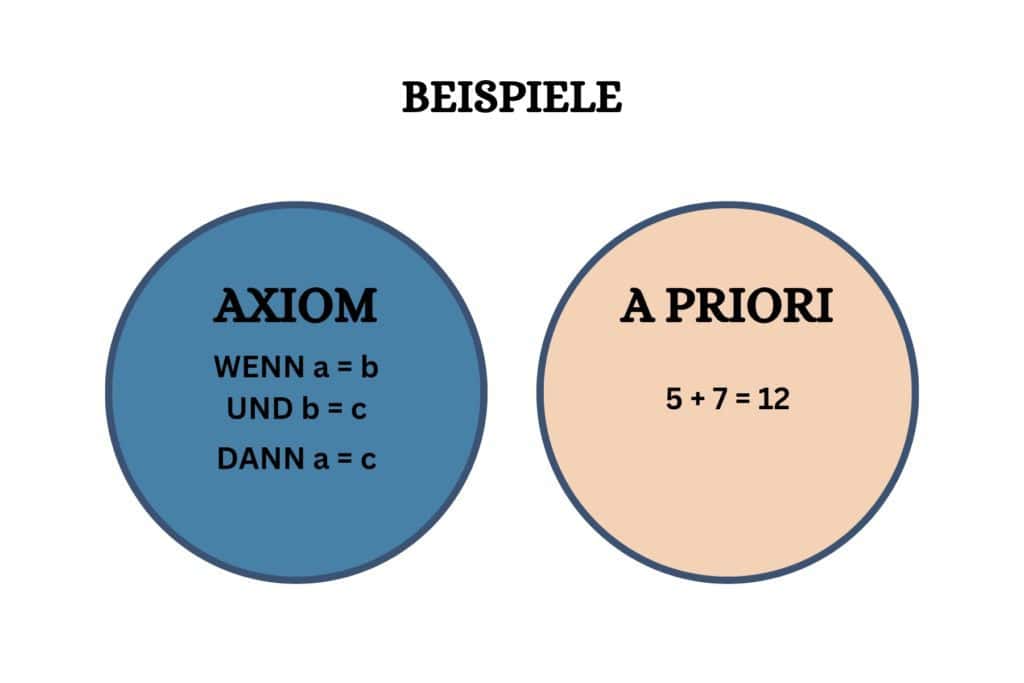The difference between "a priori" and "axiom" explained
The terms "a priori" and "axiom" are both important in philosophy and logic, but they stand for different concepts:
A Priori
The term "a priori" refers to knowledge or justifications that are independent of experience. "A priori" knowledge is based on logical conclusions and not on empirical evidence. This contrasts with "a posteriori" knowledge, which is derived from experience or empirical evidence. For example, the statement "All bachelors are unmarried" is considered to be a prioribecause their truth can be recognized by understanding the definitions of the words involved without having to examine the marital status of all bachelors.
Another example of "a priori" knowledge is mathematical truth 7 + 5 = 12. This statement is considered a priori because its truth can be recognized by logical reasoning alone, without the need for empirical verification. Unlike empirical facts that require sensory experience or observation (e.g. the statement "The sky is blue"), the truth of "7 + 5 = 12" can be determined by understanding the concepts of numbers and addition, independent of physical experience or observation. This property makes it a clear example of knowledge that is independent of empirical evidence and embodies the essence of a priori reasoning.
Axiom
An axiom is also a statement or principle that is accepted as true without proof. But axioms serve as basic building blocks from which other truths can be derived within a particular system of logic, mathematics or theory. They are taken for granted and are used to derive further truths or theorems. In mathematics, for example, the statement "There is exactly one straight line through any two points" is an axiom of Euclidean geometry.
Another example of an axiom in the field of mathematics is the axiom of equality, which states that if a = b and b = cthen a = c. This axiom is fundamental to thinking in mathematics because it establishes a basic principle of equality that is accepted without proof. It forms the basis for many mathematical operations and proofs and serves as a starting point from which other theorems can be logically derived. The axiom of equality is self-evident and does not need to be proven empirically. It plays a crucial role in the structure of mathematical logic and algebra.

Key differences
- Origin of validityThe validity of an "A Priori" statement follows from logic or inherent reasoning without the need for empirical evidence. The validity of an axiom is presupposed; it is accepted as a starting point within a particular theoretical framework.
- Role in knowledge and systemsA priori knowledge helps to distinguish between knowledge gained through reasoning and experience. Axioms serve as basic principles from which other statements within a particular system are derived.
- Area of applicationA priori is a broader philosophical concept applicable to knowledge in general, including mathematics, logic and other fields. Axioms are mainly used in formal systems such as mathematics, logic and theoretical sciences, as they represent the first truths on which the system is built.
While "a priori" knowledge is about how we know something (independent of experience), an axiom is about the fundamental truths on which a logical or mathematical system is built and which are accepted without proof.
The two concepts may not be easy to understand straight away - at least that's how I felt - which is why we are taking a second attempt here, using a different angle. We will use the second examples we mentioned above: the axiom of equality and mathematical truth. If a = b and b = c, then a = c on one side and 5+7=12 on the other.
The essential difference between an axiom such as the axiom of equality and a priori knowledge lies in their role and in the way they are used in reasoning and knowledge acquisition:

Axiom: A starting point within a system
- Contextual basisAn axiom serves as the basis or starting point within a certain system (e.g. mathematics, logic). It is accepted as true within this system without having to be proven.
- System-specificTheir acceptance is more conventional and depends on the rules and needs of the system on which they are based. Axioms are used to construct and verify the further propositions and theorems of the system.
- PurposeThe main purpose of an axiom is to create a foundation on which a coherent, internally consistent system can be built.
A priori knowledge: Independence from experience
- Universal applicabilityIn contrast to axioms, which are system-specific, a priori knowledge claims a universal validity that does not depend on the rules of a particular theoretical system.
- Basis of justificationA priori knowledge is justified independently of experience. Its truth is determined solely by reasoning, not by empirical verification or observation.
- Nature of truthA priori truths are regarded as necessarily true in all possible worlds because of their logical form or the inherent nature of their terms.
Conclusion
The main difference lies in their application and justification. Axioms are fundamental truths that are assumed within a particular system for the purpose of reasoning or constructing that system. They are like the rules of a game that have been agreed upon in order to play the game of mathematics or logic. A priori knowledge, on the other hand, refers to truths that are valid independently of a particular system. They are derived through reasoning or logic that is not based on sensory experience or empirical data.
The axiom of equality is a specific system of mathematics and logic that forms a necessary basis for operations and proofs in these disciplines. In contrast, a priori knowledge such as "7 + 5 = 12" is recognized by conclusions that do not depend on the basic assumptions of a particular system, but on the inherent meaning of numbers and addition.







